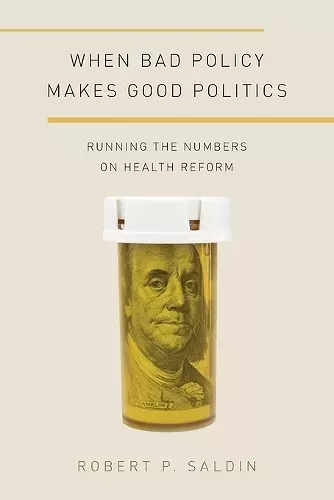When Bad Policy Makes Good Politics
Running the Numbers on Health Reform
Format:Paperback
Publisher:Oxford University Press Inc
Published:30th Mar '17
Currently unavailable, and unfortunately no date known when it will be back
This paperback is available in another edition too:
- Hardback£117.50(9780190255435)

From all outward appearances, the American policymaking process has been revolutionized in the last half century. Beginning in the 1970s, new safeguards were put in place to prevent the kind of free-wheeling and sometimes reckless policymaking environment of earlier periods. These changes--including the creation of the non-partisan Congressional Budget Office--were widely hailed as ushering in a new era of accountability in Washington and putting an end to the days when cagey political operatives could rush major legislation through Congress without any real consideration of the economic costs. But what if the supposedly new and improved policymaking process that resulted from these 'good government' reforms is every bit as prone to manipulation as the one it replaced? As Robert Saldin shows in When Bad Policy Makes Good Politics, that has unfortunately been the case. As in the past, the new politics of the policymaking process encourage savvy political actors to game the system. The very rules that were designed to thwart financially irresponsible legislation now incentivize the development of fundamentally flawed and unworkable policies. To uncover the pathologies of the American policymaking process, Saldin traces the sad tale of the Community Living Assistance Services and Supports (CLASS) Act. While few outside the beltway are aware of it, it was a major piece of legislation that played a central role in the passage of the Affordable Care Act (ACA), the most important social policy law since the 1960s. The CLASS Act targeted an intractable problem: the ever-increasing demand for costly long-term care services. For decades, both Republicans and Democrats have recognized the problem as a major one, so the question has not been whether we should tackle it. Rather, the debate centered on how we should do it-that is, how we should pay for it. The problem was always that the costs were staggering, and there was little political will to fund such a program (Medicare did not fund it). Long term care advocates realized this, and therefore focused on passing a law that effectively ignored the economic costs. They finally shuttled it into the larger Affordable Care Act, which was passed into law in 2010. Saldin traces the process, showing how an array of perverse incentives allowed such a flawed law to come into being. In...
Rob Saldin has written the kind of book that I wish I had authored, the kind that is an instant "classic" in the discipline. * Patricia Strach, The Forum *
When Bad Policy Makes Good Politics helps readers to appreciate the challenges of advancing solutions in the policy domain of long-term care, which are themselves fascinating, complex, and likely largely unknown to readers. The book also adds depth to our understanding of the ACAs passage, contributing to our knowledge of that history. Saldins book should find broad readership among those interested in both the intricacies and intrigues of Congress, as well as health care more generally. * Daniel Skinner, Ohio University, Political Science Quarterly *
When Bad Policy Makes Good Politics is a direct and thoughtful contribution to our understanding of specific health politics during the tumult of the ACAs legislative development. Saldins attentive and thorough contribution improves our understanding of how budget politics are ubiquitous and likely to produce counterintuitive and counterproductive public policy. * Glenn Beamer, Tyler M. Gibbons, Seton Hall Universit *
Primarily, of course,When Bad Policy Makes Good Politics helps readers to appreciate the challenges of advancing solutions in the policy domain of long-term care, which are themselves fascinating, complex, and likely largely unknown to readers. The book also adds depth to our understanding of the ACA's passage, contributing to our knowledge of that history. Saldin's book should find broad readership among those interested in both the intricacies and intrigues of Congress, as well as health care more generally. * Daniel Skinner,Ohio University, Political Science Quarterly *
ISBN: 9780190255442
Dimensions: 152mm x 234mm x 13mm
Weight: 272g
184 pages